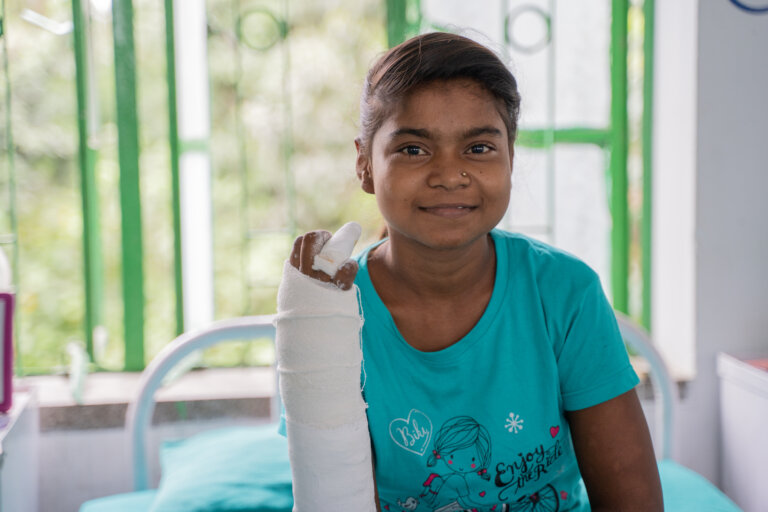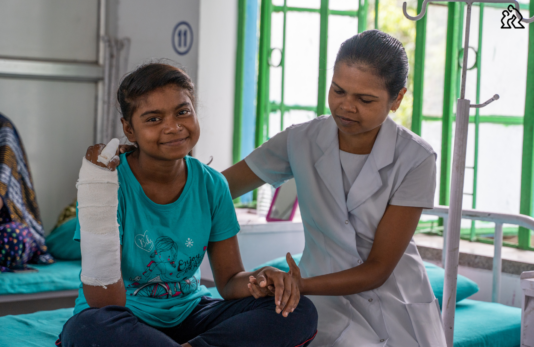- About
- Topics
- Story
- In-Depth
- Picks
- Opinion
- News
- Donate
- Signup for our newsletterOur Editors' Best Picks.Send
Read, Debate: Engage.
| topic: | Health and Sanitation |
|---|---|
| tags: | #United Kingdom, #health, #India, #poverty |
| located: | United Kingdom, India |
| by: | Cameron Boyle |
Disclaimer: The views expressed in the article belong to the author and do not necessarily represent the position of FairPlanet.
At 18 years old, Rajisha should have been taking her final exams and looking forward to a bright future. Instead, she was miles away from her home at the Leprosy Mission hospital in Muzaffarpur, India.
Rajisha was diagnosed with leprosy in her local village. But had to travel 100 miles alone to receive the treatment she needed to straighten her fingers that were once clawed by leprosy.
"When I came to the hospital, I was depressed but being here has given me hope," she said
Despite its hopeful ending, Rajisha's story exemplifies the scale of health inequity facing the globe: Missing out on education; travelling unfathomable distances for treatment; grappling with disease. No young person should encounter any of these things.
Yet still, in 2024, a childhood free from illness is determined by the lottery of birth.
With the world in the grip of colliding crises - from conflict to climate change - health inequities are deepening further. Most recently in Gaza, we have seen how attacks on health facilities violate the right to health; severing a vital lifeline at the most critical time. As the climate crisis has worsened, we have seen increased extreme weather events such as floods, droughts and wildfires, and surges in both non-communicable and infectious disease.
Against this bleak backdrop, global health progress has unsurprisingly slowed. But coalescing catastrophes are not the only factor - in recent years, the UK has slashed its Official Development Assistance (ODA) spending on health, harming its status as a global health champion.
Between 2020 and 2021, the UK's health spending halved from USD 1.5bn to 763m, taking a heavy toll on equity. The Foreign, Commonwealth and Development Office's (FCDO) Equalities Impact Assessment states, "there will be a significant reduction in the number and size of targeted programme activities aimed at reaching those furthest behind – including women, girls and people with disabilities."
With this troubling trajectory showing no signs of slowing, the time for action is now. To restore its position as a global health champion, the UK Government must take bold strides to ensure that everyone, everywhere, has access to quality, affordable healthcare.

Rajisha at Muzaffarpur Hospital, Bihar, India. © Henry Frankel/The Leprosy Mission
Through its Stocktake Review, Action for Global Health provides the roadmap for progress. The report's ambitious vision contains actionable steps through which the UK can advance health equity in the midst of crisis.
One such step involves strengthening the health workforce in low- and middle-income (LMIC) countries. Despite shouldering a quarter of the global disease burden, Africa has just a 4 per cent share of the global health workforce. This disparity is deepened by the flight of health workers to high-income countries, which grew steadily from fewer than 2.5 million in the 1960s to over 5 million between 2010 and 2015.
The exodus of talent not only weakens health systems but causes dependency on foreign aid, harming efforts to achieve the Sustainable Development Goals (SDGs) and Universal Health Coverage (UHC).
Atia, a leprosy community worker from Mozambique, embodies the importance of a strong health workforce.
Affected by leprosy herself, Atia uses her own experiences to encourage others to seek timely treatment. Her role involves challenging misconceptions about leprosy to reduce stigma and discrimination. And she teaches people affected by leprosy self-care to reduce their likelihood of developing permanent disabilities.
Leprosy, a disease of poverty, still occurs in more than 120 countries, with more than 200,000 new cases reported every year. Were it not for the dedication of people like Atia, the impact would be even more devastating.
The UK must support health workers like Atia by providing the training, equipment and remuneration that will help them continue to flourish.

Atia in Cabo Delgado, Mozambique. ©Ricardo Franco/The Leprosy Mission.
Ultimately, the Stocktake Review's goal is a world where everyone has access to the treatment they need, when and where they need it. Each recommendation is conducive to this goal, but one in particular centres on the UK increasing support to free healthcare initiatives, ensuring they are reaching the furthest behind first.
It is a cruel paradox that around the world, accessing healthcare pushes people into hardship, but nonetheless, this is reality.
Currently, 800 million people spend at least 10 per cent of their household budgets on health expenses for themselves, a sick child or other family member. For almost 100 million people, these expenses plunge them into extreme poverty, forcing them to survive on just USD1.90 or less a day.
This injustice cannot continue. Health is a universal right, yet this right is constantly ripped away by stark health inequities. By providing tangible support to initiatives that remove the financial burden, the UK government can alleviate hardship and contribute to achieving health for all.
All in all, the report is an ambitious vision for a world where the right to health is realised. Other recommendations include ensuring that climate considerations are integrated into all health programming - crucial given the looming threat of irreversible climate change - and ensuring all health programmes make clear how they will tackle health inequalities.
In a world beset by overlapping crises - where disadvantaged groups are impacted the most - this emphasis on inequality is vital. Without an approach that leaves no one behind, equity will remain an abstract goal, so it is encouraging to see this approach translated into achievable, measurable steps. In the wake of a general election, the UK has the perfect opportunity to seize the initiative by implementing them.
It is now time to look to the future. In the words of Dr Peter Baker, Deputy Director, Global Health Policy at Center for Global Development and member of the Stocktake Review Advisory Group:
"This is a vital turning point in the UK's role in global health after many challenging years. All eyes need to be on what the UK does next."
Cameron Boyle is a Senior Digital Campaigns and Media Advisor at Action for Global Health.
Header image by Henry Frankel/The Leprosy Mission.
